|
|
|
Sort Order |
|
|
|
Items / Page
|
|
|
|
|
|
|
| Srl | Item |
| 1 |
ID:
108080
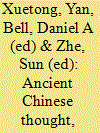

|
|
|
|
|
| Publication |
Princeton, Princeton University Press, 2011.
|
| Description |
viii, 300p.
|
| Standard Number |
9780691148267, hbk
|
|
|
|
|
|
|
|
|
|
|
|
Copies: C:1/I:0,R:0,Q:0
Circulation
| Accession# | Call# | Current Location | Status | Policy | Location |
| 056349 | 327.51/XUE 056349 | Main | On Shelf | General | |
|
|
|
|
| 2 |
ID:
179493
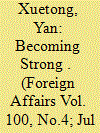

|
|
|
|
|
| Summary/Abstract |
In March, China’s top diplomat,
Yang Jiechi, made headlines when
he told U.S. ocials at a summit in
Alaska that they did “not have the
quali¾cation . . .to speak to China from a
position of strength.” Even afteryearsof
heightened tensions between Beijing and
Washington, the remark seemed unusually harsh, especially coming from a
seasoned diplomat.
|
|
|
|
|
|
|
|
|
|
|
|
|
|
|
|
| 3 |
ID:
175848
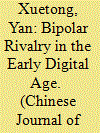

|
|
|
|
|
| Summary/Abstract |
The year 2019 saw the curtain rise on a US–China bipolar rivalry quite different from the Cold War US–Soviet bipolarity. The fundamental difference between the current bipolar rivalry and that during the Cold War is that ideology is no longer the main engine driving international competition, but rather the new digital dimension of strategic competition that is emerging between the United States and China. Technological advancement over the past 15 years has led world history’s entry into the early digital age. The development of digital technology has created new ways of protecting national security, of accumulating national wealth, and of obtaining international support. Cybersecurity is becoming the core of national security and the share of digital economy in major powers’ gross domestic product dramatically increases. For the leading powers, strategic competition in cyberspace in this early digital age outstrips to a crucial extent that within physical geographic boundaries. This article observes that Cold War mentality and digital mentality will have mixed impact on foreign policy-making in the digital age, and that interactions between the nations whose foreign policy is simultaneously influenced by both mentalities will shape the emerging international order into one of uneasy peace, where there is no direct war and few proxy wars. It will rather be a scenario reflecting the dark side of globalization and downside of global governance, evident in the violation of agreements, double dealing, cyber-attacks, and technology decoupling between states. Although further digital advancement will indeed change international politics in ever more aspects, US–China bipolar configuration will nevertheless remain in place for at least for two decades, or perhaps longer.
|
|
|
|
|
|
|
|
|
|
|
|
|
|
|
|
| 4 |
ID:
050940
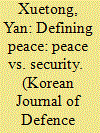

|
|
|
| 5 |
ID:
114900
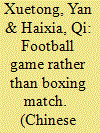

|
|
|
|
|
| Publication |
2012.
|
| Summary/Abstract |
Shortly after US President Obama and Australian Prime Minister Julia
Gillard sealed the bilateral defense deal in November 2011 under which
2500 US marines will be stationed in Australia came Obama's announcement on January 5 2012 of the new strategic defense guidance entitled
Sustaining U.S. Global Leadership: Priorities for the 21
st
Century Defence.
The document claims that China's rise might have impact on the US economy and security, and that countries such as China and Iran continue to
pursue asymmetric means of countering US power projection capabilities.
1
Both the Chinese Ministry of Foreign Affairs and the Ministry of Defense
refuted these claims, arguing that not a shred of evidence exists to support
such wild accusations.
2
Many media reports nevertheless argue that competition between the United States and China amounts to a new Cold War.
|
|
|
|
|
|
|
|
|
|
|
|
|
|
|
|
| 6 |
ID:
123632
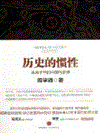

|
|
|
|
|
| Publication |
China, CITIC Press, 2013.
|
| Description |
ix, 259p.Pbk
|
| Contents |
In Chinese Language
|
| Standard Number |
9787508640433
|
|
|
|
|
|
|
|
|
|
|
|
Copies: C:1/I:0,R:0,Q:0
Circulation
| Accession# | Call# | Current Location | Status | Policy | Location |
| 057446 | 951/XUE 057446 | Main | On Shelf | General | |
|
|
|
|
| 7 |
ID:
098866
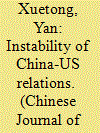

|
|
|
|
|
| Publication |
2010.
|
| Summary/Abstract |
China and the United States signed a joint statement during US President Barack Obama's four-day state visit to China in November 2009 in which President Obama and Chinese President Hu Jintao, 'reached agreement to advance China-US relations in the new era'.1 These relations, however, soured after successive fallings-out over US trade sanctions on Chinese seamless steel tubes, Secretary of State Hilary Clinton's criticism of China's internet freedom, US arms sales to Taiwan, and Obama's meeting with the Dalai Lama in the White House-that began only one month after Obama's visit and carried on through to February 2010.2 Just as political commentators began to understand the reasons for this 180-degree shift over such a short period they were taken back afresh on April 2 when the relationship made a rapid recovery, evident in the hour-long telephone conversation that day between President Hu and President Obama on cooperation.3 Few appeared to have noticed that sudden deteriorations followed by rapid recoveries have been the norm in China-US relations since the 1990s. This article explains the enduring phenomenon using a theory of superficial friendship-namely the policy of pretending to be friends.
|
|
|
|
|
|
|
|
|
|
|
|
|
|
|
|
| 8 |
ID:
107285
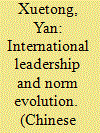

|
|
|
|
|
| Publication |
2011.
|
| Summary/Abstract |
Since the end of the Cold War, fast-paced globalization has increased interaction among states and promoted development of international norms in many fields. Constructivists argue that international interactions can only advance international norms towards a Kantian culture of friendly mutual help and could not propel any regression to a Hobbesian culture of hostile confrontation.1 We can observe, however, that the reality of international politics does not support this argument. Although certain interactions have promoted international cooperation, others have intensified international conflicts. For instance, China, the United States, Russia, Japan, South Korea and North Korea held during the five years from August 2003 to December 2008 seven rounds of Six Party Talks on nuclear issues on the Korean Peninsula. The six nations' continuous interaction during this period, however, resulted not in North Korea's acceptance of the norm of non-proliferation, but in its conducting on May 25 2009 its second nuclear test.2 This example calls to question whether or not interaction among states drives international norms in one specific direction. Drawing on the Pre-Qin philosophers' idea that the type of monarch has different impacts on relations among states, this article analyses how the different types of leadership of a leading power influence the process and direction of evolution of international norms.
|
|
|
|
|
|
|
|
|
|
|
|
|
|
|
|
| 9 |
ID:
145190
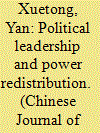

|
|
|
|
|
| Summary/Abstract |
The theoretical puzzle that moral realism must crack is that of why a rising state is able to displace a dominating hegemon even though it is inferior to the latter in terms of economic base, technical invention, education system, military strength, and political system. Moral realism attributes political leadership to the rise or decline of great powers and categorizes political leadership, according to morality, as inactive, conservative, proactive, or aggressive types at national level, and as tyranny, hegemony, and humane authority at international level. Moral realism is a binary theory which suggests that a state’s strength determine strategic interests while types of political leadership determine strategies for achieving those interests. According to moral realist theory it will be possible for China to change the international system in the 21 century if it practices the moral principles of fairness, justice, and civility both at home and abroad.
|
|
|
|
|
|
|
|
|
|
|
|
|
|
|
|
| 10 |
ID:
124182
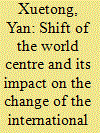

|
|
|
|
|
| Publication |
2013.
|
| Summary/Abstract |
The shift of power engendered by the rise of China will not only change the current international configuration, but will likely lead to a shift of the power centre of the world from Europe to East Asia. Nevertheless, neither the change of the international configuration nor this transfer of the power centre of the world will inevitably bring about the change of the international system. The international system consists of three components including international actors, international configuration and international norms. If a qualitative change of one of these components were treated as a qualitative change of the system, it would not be possible to distinguish the difference between the components and the system nor to determine the relationship between them. A minimum of a qualitative change of at least two components must be observed to be defined as a qualitative change in the system. Because the rise of China is the main engine changing the international configuration, it will be faced with increasing pressure from the system. Thus, China has to adopt a foreign strategy in accordance with its international status and policy for wining more strategic partners and constructing new international norms.
|
|
|
|
|
|
|
|
|
|
|
|
|
|
|
|
| 11 |
ID:
082307
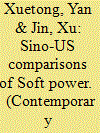

|
|
|
| 12 |
ID:
062068
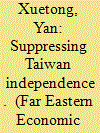

|
|
|
| 13 |
ID:
116397
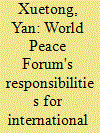

|
|
|
|
|
| Publication |
2012.
|
| Summary/Abstract |
World Peace Forum, sponsored by Tsinghua University and co-sponsored by the Chinese People's Institute of Foreign Affairs (CPIFA), was held in Tsinghua University on July 7-8, 2012. As the first high-level non-governmental international security forum hosted by China, it attracted wide-ranging attention from all sides and was universally recognized by international media. According to the post-forum statistics, 37 media from 21 countries in addition to China made active and positive coverage of this forum, particularly the address by Mr. Xi Jinping, Vice President of China. At a time when disputes over East Asian Ocean was heating up and the "China threat" fallacy was running rampant in the Asia-Pacific region, the World Peace Forum hosted by China was widely recognized by international media. In the perspective of public diplomacy, this is an international phenomenon worth studying.
|
|
|
|
|
|
|
|
|
|
|
|
|
|
|
|
| 14 |
ID:
174885
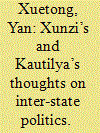

|
|
|
|
|
| Summary/Abstract |
Xunzi and The Kautilya Arthasastra are full of rich philosophical thoughts on inter-state relations. This article undertakes a comparison between them in terms of their methods of writing, views on the nature of inter-state systems and arguments about a state’s comprehensive power. This article finds that the leadership’s determination and emphasis on morality are two important shared mentalities between Xunzi and Kautilya. Both attribute the rise and fall of a state mainly to state leadership rather than material factors or the political system. Regarding the survival of a state, they both stress the importance of the leadership’s morality in handling inter-state affairs. Unfortunately, their ideas about leadership morality have not been whole-heartedly adopted by major powers to their foreign policy-making in the twenty-first century.
|
|
|
|
|
|
|
|
|
|
|
|
|
|
|
|
|
|
|
|
|